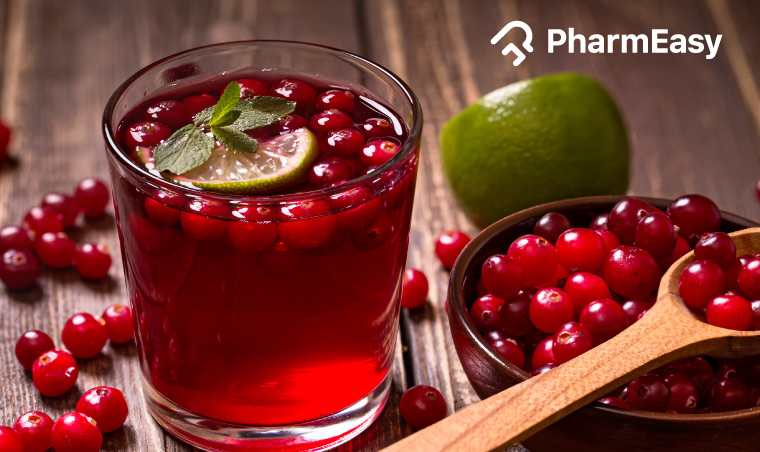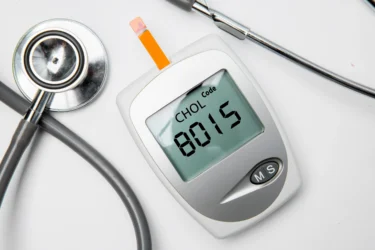Cranberry Juice: Uses, Benefits, Side Effects and More!
By Dr Ashok Pal +2 more

Get,

to manage your symptom
Get your,


4 Cr+ families
benefitted

OTP sent to 9988776655



You’ve successfully subscribed to receive
doctor-approved tips on
Whatsapp

Get ready to feel your best.

Hi There,
Download the PharmEasy App now!!


Register to Avail the Offer
Send OTPBy continuing, you agree with our Privacy Policy and Terms and Conditions

Hi There,
Sign up on PharmEasy now!!
Trusted by 4 crore+ families

OTP sent to 9988776655



You have unlocked 25% off on medicines




Code: NU25
By Dr Ashok Pal +2 more
Table of Contents
Cranberries are typically sour, a bit sweet and rarely bitter. These delicious little berries are considered a functional food. Add to your salads or simply grind them in a jar, cranberries make for excellent addition to any dish. Cranberry juice is a delicious beverage with an attractive bright red color thanks to the anthocyanin pigment present in it. It has high amount of acidity and tartness and less amount of sugars, making it a great combination with other sweet fruit juices1,2.
Cranberry juice can be easily made at home; you need fresh ripe cranberries. The juice can be obtained by cold pressing or simply blending the berries in a juicer. If you don’t like their sour taste, add some sugar to cut through the sourness. You can also store the cranberry juice in a sealed dark container till you feel like sipping on it at a later time1.

The cranberry plant that produces these berries is an evergreen shrub mainly grown for its red, delicious cranberries. It is cultivated in North and South America, Great Britain, Australia, Newzealand and Europe. It is scientifically known as Vaccinium and belongs to the family Ericaceae2.
Let’s read more about this sweet and sour juice and its potential uses, benefits, and side effects.
Did you know?
Cranberries are healthy fruits with a whopping 85% water content. Cranberry juice has high nutritional value because of its chemical composition. It has a relatively low sugar content and a high amount of organic acids, vitamins, minerals, flavonoids, and anthocyanins2. It is packed with vitamins, minerals and antioxidants.
The nutritional value of cranberry juice is as follows:
Cranberry juice is a rich source of valuable phytochemicals, such as vitamins and phenolic compounds, which may contribute to its biological properties listed below2.
Back in the day, Native Americans used cranberries to tackle the damage done by arrow wounds. Cranberries were also used to dye rugs and blankets. Now, cranberries have shown a myriad of health benefits6.
Dr. Siddharth Gupta, B.A.M.S, M.D (Ayu)
Cranberry juice might be beneficial for health and may be recommended for daily use owing to its high nutritional profile. Some potential uses of cranberry juice are as follows:

The most well-known benefits of cranberry juice are that it may be beneficial for urinary tract infections (UTI). The UTI incidence increases with age. Few antibiotics are proven effective, but they carry side effects too. Therefore, non-antibiotic strategies like drinking cranberry juice have been considered4.
The health benefits of cranberry juice might be associated with the presence of A-type proanthocyanidins antioxidant. It may decrease the attachment activities of bacteria that cause urinary tract infections. The French Food Safety Authority (Apr 2004) statement suggests that proanthocyanidins from cranberries might help reduce the adhesion of certain E. coli types pathogenic bacteria to the urinary tract1.
This information is insufficient because there is lack of studies in humans. We require more human trials to back this claim. Therefore, you should speak to your doctor and only then have cranberry juice for UTIs.

The benefits of cranberry juice may be because of its antioxidant activity. Anthocyanins are important antioxidants that might be effective in lowering cholesterol levels. They play an important role in free-radical scavenging, which might benefit by reducing the low-density lipoproteins (the ”bad” cholesterol) in the body and may help produce ”good” cholesterol1.
However, this information is insufficient as these studies are not done on humans. Hence, more studies on humans are required to back this claim. Therefore, it is essential to first speak to your concerned doctors and only use cranberry juice as a medicine.

The health benefits of cranberry juice may have potential uses in the management of dental disease. The antibacterial properties of cranberry juice might stop the sticking of bacteria to the surface tooth, which may be beneficial in decreasing the formation of dental plaques. However, this information is insufficient and requires more clinically tested proof on humans4. Therefore, it is necessary to take a doctor’s advice before using cranberry juice for dental health.

Though there are studies showing the benefits of cranberry juice in various conditions, these are insufficient, and there is a need for further studies to establish the true extent of the benefits of cranberry juice on human health. Every person may respond differently to these herbs. Therefore, it is important to consult a doctor before using cranberry juice for any medical condition as a replacement for conventional medical treatment.
Cranberries may help improve digestive health for people consuming an animal-based diet. Cranberries do so by reducing the bad microbes found in the colon7.
Dr. Rajeev Singh, BAMS
The cranberry juice uses are as follows:
You should consult an Ayurvedic physician before drinking cranberry juice on a daily basis. In addition, we recommend you do not replace or discontinue your ongoing medications with any herbal preparations without seeking the medical advice of a doctor. They will guide the best form and dosage in which the herb can be used per your health condition.
Also Read: Carrot Beetroot Juice: Uses, Benefits, Side Effects and More!
Drinking cranberry juice every day in moderate volume has not shown any side effects4. However, excess consumption might be dangerous to health. The cranberry juice side effects are described as follows: Cranberry juice contains a high amount of oxalate and long-term intake may precipitate urinary stone formation, which might lead to kidney stones4.
However, if you already have kidney-related issues, we recommend you avoid having the juice. And if you experience such side effects, immediately seek medical attention from your physician. They will prescribe you a better treatment.
Drinking cranberry juice in a moderate dosage is safe. However, general precautions must be followed.
Also Read: Cucumber Juice: Uses, Benefits, Side Effects and More!
The bioactive compound such as antioxidants and flavonoids of cranberry juice might interact with other drugs resulting in herb-drug interaction. This phenomenon might affect the complete metabolism of certain drugs5.
Thus, if you take blood-thinning drugs, you must consult an Ayurvedic physician before consuming cranberry juice. They will direct you to the better way to have cranberry juice as a herb.
Also Read: Amla Juice: Uses, Benefits, Side Effects and More!
Cranberry juice contains vitamin C, vitamin E, vitamin B2, vitamin B3, vitamin B1, vitamin B9, vitamin B6, vitamin K and vitamin A3.
Drinking cranberry juice in small quantities is considered safe until excessive consumption happens4. However, no report was recorded related to any side effects of cranberry juice during pregnancy. Therefore, before having it, one should take advice from a qualified doctor to avoid any complications.
The essential phytochemicals such as proanthocyanins, carotenoids, flavonoids, Vitamin C and phenolic acids are present in cranberry juice. These are the principal substances that might be responsible for the anti-cancer, antioxidant, antibacterial and glucose-lowering activity2. However, a doctor’s consultation is necessary prior to use cranberry juice. They will prescribe you the best dosage form according to your health condition.
Cranberry juice may have antibacterial activity. Drinking cranberry juice might be one of the non-antibiotic strategies that may be beneficial in managing recurrent urinary tract infections. However, this data is insufficient and requires more information on human trials. Therefore, without well-designed controlled trials, this strategy cannot be clinically recommended4.
Yes. There is a case reported5 by Suvarna et al. (2003) that suggested cranberry juice might interact with other drugs such as (warfarin, digoxin, and phenytoin). The case study was of a seventy-year-old man who died of a gastrointestinal (digestive tract) and pericardial (heart-sac) haemorrhage (bleeding). Therefore, it is essential to consult a doctor before using cranberry juice for any health condition. In addition, we recommend you do not change your ongoing treatment with any herbal preparations.
1. Ilić DP, Troter DZ. Cranberry (Vaccinium macrocarpon L.) fruit juice from Serbia: UHPLC-DAD-MS/MS characterization, antibacterial and antioxidant activities. LWT. 2021;146(1):111399. doi:10.1016/j.lwt.2021.111399. Available from: https://www.researchgate.net/publication/350454187_Cranberry_Vaccinium_macrocarpon_L_fruit_juice_from_Serbia_UHPLC-_DAD-MSMS_characterization_antibacterial_and_antioxidant_activities
2. Bobis, O., Nayik, G.A., Wagay, J.A., Farooq, U., Zehra, A., Nanda, V. (2020). Cranberry. In: Nayik, G.A., Gull, A. (eds) Antioxidants in Fruits: Properties and Health Benefits. Springer, Singapore; 2020. p.479–505. Available from: https://link.springer.com/chapter/10.1007/978-981-15-7285-2_25
3. United States Department of Agriculture [Internet] Cranberry juice, unsweetened; 2019 Apr 1. [cited 2022 Jul 1]. Available from: https://fdc.nal.usda.gov/fdc-app.html#/food-details/168117/nutrients
4. Harkins KJ. What’s the use of cranberry juice? Age and Ageing. 2000;29(1):9–12. Available from: https://pubmed.ncbi.nlm.nih.gov/10690688/
5. Sylvan L, Justice NP. Possible interaction between warfarin and cranberry juice. BMJ (Clini Res ed). 2003;327(7429):1454–1454. Available from: https://europepmc.org/backend/ptpmcrender.fcgi?accid=PMC300803&blobtype=pdf
6. Neto CC, Vinson JA. Cranberry. In: Benzie IFF, Wachtel-Galor S, editors. Herbal Medicine: Biomolecular and Clinical Aspects. 2nd ed. Boca Raton (FL): CRC Press/Taylor & Francis; 2011. Chapter 6. PMID: 22593931. Available from: https://pubmed.ncbi.nlm.nih.gov/22593931/
7. Cleveland Clinic. Are Cranberries Healthy? 6 Surprising Benefits [Internet]. Cleveland, OH: Health Essentials, Cleveland Clinic; 26 Jan 2022 [cited 2026 Jan 22]. Available from: https://health.clevelandclinic.org/benefits-of-cranberries
Disclaimer: The information provided here is for educational/awareness purposes only and is not intended to be a substitute for medical treatment by a healthcare professional and should not be relied upon to diagnose or treat any medical condition. The reader should consult a registered medical practitioner to determine the appropriateness of the information and before consuming any medication. PharmEasy does not provide any guarantee or warranty (express or implied) regarding the accuracy, adequacy, completeness, legality, reliability or usefulness of the information; and disclaims any liability arising thereof.
Links and product recommendations in the information provided here are advertisements of third-party products available on the website. PharmEasy does not make any representation on the accuracy or suitability of such products/services. Advertisements do not influence the editorial decisions or content. The information in this blog is subject to change without notice. The authors and administrators reserve the right to modify, add, or remove content without notification. It is your responsibility to review this disclaimer regularly for any changes.
Comments

Leave your comment...
You may also like
Comments